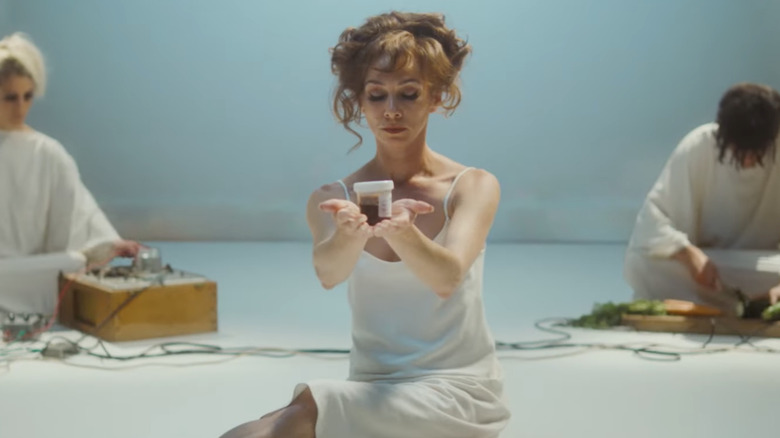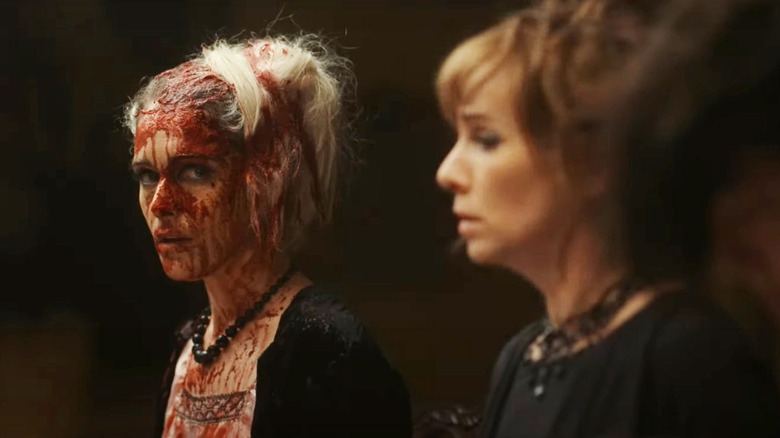Flux Gourmet Review: A Bold Genre Entry With A Slight Genre Misrepresentation That Doesn't Diminish The Fun
Gastrointestinal issues can be a real nightmare, and Peter Strickland's fifth and latest feature film, "Flux Gourmet," is here to show you just how rough an intestinal disruption can be, especially while in the midst of creating thought-provoking, boundary-pushing art. The auteur's newest genre entry is itself thought-provoking and boundary-pushing, and even despite a bit of a misrepresentation of genre, it sticks out as a bold and self-assured film determined to reframe art and food in its audience's mind. Whether or not it succeeds is an individual decision left to each viewer, but there are several overall strengths that can't be denied no matter how you end up feeling about the zany concept.
"Flux Gourmet" follows a "sonic culinary" collective of artists who strive to create compelling and complex sounds by marrying sound equipment with food. Then they showcase their performance art, no matter how stomach-churning, for the world to see. The group — which consists of leader Elle (Fatma Mohamed) and companions Lamina (Ariane Lebed) and Billy (Asa Butterfield) — are accepted into a residency program helmed by the refined yet secretly bombastic Jan Stevens (Gwendoline Christie). While in her program, the group is shadowed by an outsider dossier (Makis Papadimitriou) tasked with record-keeping their time developing work under Stevens' tutelage. Soon, the dossier comes to realize that he fits in with the collective more than he ever thought he would.
While claiming its foundation on an interesting and relatively unheard-of concept — I'm going to venture to guess that you've never been presented with the idea of "sonic culinary art" — the performances in "Flux Gourmet" are the actual bedrock of the film. Christie shines as the enigmatic, prim, and secretly horny-as-hell collective head who takes a shine to Butterfield's Billy and uses him to attempt to get her way against Mohamed's headstrong Elle. She's quite determined herself, but in contrast to Elle, very proper and reserved. To see the two women go head-to-head with such different methods to their madness is a treat and furthers the reality that not all women are created equal. In fact, each of the three women is quite different, showcasing a wide breadth of personalities, motivations, and impulses.
Stones, the quiet and observant dossier played by Papadimitriou, is also very fun to watch despite his more muted personality in comparison to the others he shares the screen with. He's very much the straight man of this black comedy, and his own gastrointestinal struggles frame the film's narrative in a relatable and deadpan way that only makes you want to keep watching to see exactly where his observations will lead him. Additionally, the collective as a whole is quite messy and full of power dynamics, which make for exciting interactions throughout. They play off each other extremely well, even while a lot of it is negative within the confines of the story. As a viewer, their discord is palpable and exhilarating because it clearly highlights the cracks in their collective nature. After all, the dramatics from within an organization are always fun fare to observe, even on the big screen.
Another zany Peter Strickland genre entry
The film's other strong suit is, of course, its stylized look and sound. The movie has that dreamy, nearly vintage look to it. All of Strickland's work has this dreamlike quality about it. His previous film, the 2018 horror darling "In Fabric," has a similar look. The aesthetic is pleasing and makes the viewer feel Strickland's touch on not only the story but the visuals. That's not to say that films that haven't been distinctly colorized don't have a strong directorial touch, but it reinforces the specificity of Strickland's tastes, which are just a whole aesthetic mood. Additionally, the film has a seriously intense soundscape that is certainly as much a part of the story as it is part of the movie as a whole. It's vast and it overcomes you in its intensity, but it's hard to not be utterly compelled by the sounds the collective creates. The movie's sound design begs to be listened to with the best speakers and sound system possible, all the better if that happens to be at your local theatre that's screening the film. That said, even a good pair of headphones will have you experiencing sound in a whole new way with how the film packages it and presents it alongside its visual feast.
Aside from pushing the audience's buttons with food, and also substances that shouldn't necessarily mix with what we eat, "Flux Gourmet" lays bare several important themes that are, simply, very reflective of and true to life. The film puts a heavy focus on "female domestic oppression" — and interestingly enough, juxtaposes and further highlights that with the physical oppression of the bowels. But it also highlights female sex used to control, what kind of power that wields, and how it can be used for personal gain. You have the oppressed woman and the liberated woman living in tumultuous harmony, which is quite reflective of women in the world at large and how each individual chooses to live. Butterfield's Billy says of the collective at one point, "We all hate each other anyway, even though we do need each other." I can't think of a better reflection of the times we're living in right now. One of the best things about films is seeing yourself, your story, and the world around you within them. The dynamics within the collective are quite representative of how many of us move through life in all of its complexities, and thus, the sentiment stands out in a major way.
The biggest issue I take with "Flux Gourmet," a film I mostly enjoyed for its audaciousness and dedication to a stylized concept, is that it is billed as a black comedy horror film. While gastrointestinal issues can in and of themselves be quite horrific, especially when they're self-inflicted due to embarrassment, they do not a horror film plot make. The movie doesn't really utilize any horror tropes or concepts and generally isn't scary. To be fair, a lot of horror films won't and don't scare everyone who watches them, but "Flux Gourmet" will scare no one. That doesn't take away from its enjoyability, but it does create a sort of bait and switch that was a bit of a letdown as an avid horror fan. I was excited to see how the film would potentially spiral and lean into its horror label, but it doesn't ever go there. Surrealism is a more apt label, especially in the film's performance art scenes where the collective really gives their all to their work. Once able to divorce that misjudgment from the film you actually watch, "Flux Gourmet" is an enjoyable romp that pushes buttons, defies conventions, and makes you see food in a whole new light. I'd like to think that was exactly Strickland's goal, no matter the film's ultimate genre.
/Film Rating: 6.5 out of 10

